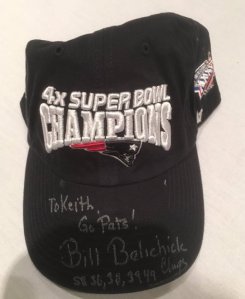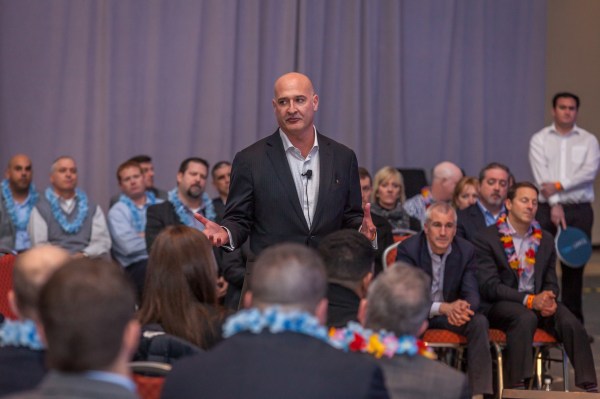The day I met Keith Block at the Salesforce World Tour in Boston he was relaxing in a suite at the Hynes Convention Center, a man at ease with his considerable responsibilities as vice chairman, president and COO at Salesforce. His Twitter bio, like mine, also lists him as a Boston sports fan. We had a lot to talk about.
The day we chatted, Block had been front and center at the morning’s event keynote, which featured Boston band, the Dropkick Murphys performing for several songs, followed by an interview with New England Patriots head coach Bill Belichick. In fact, as I entered the suite to interview Block, an autographed Patriots 4X Super Bowl Champion hat was sitting casually on a table (I took a picture).

We began our brief discussion talking a bit about our mutual love of Boston sports. He made it clear he had no divided loyalties, even though his company is based in San Francisco. Even when The Boston Celtics played the beloved Golden State Warriors, he scoffed at the idea he might have to choose. Oh no, he’s a Boston boy all the way.
As a man who spent 20 years at Oracle before joining his old friend Marc Benioff to help run Salesforce, he felt no affection for his old company either. He was a man comfortable with his situation and there was no need for sentimentality.
When I asked what a typical day was like, he joked, “Oh you know I chat with Bill Belichick.” In fact, he’s quite a busy guy and we had more to talk about than Boston sports. (Note the questions and answers have been edited for clarity and flow.)
TC: You have so much responsibility with the titles of vice chairman, president and COO. What’s a typical day like for you?
KB: My day — I’m customer focused. I like to be out in the field. I like to spend time with employees and our partners and I like to help drive transformation for our customers. I think it’s one of these things where your day never ends and we are a very fast growing company where the pace is very fast and we want to make sure we do the right things for all of our stakeholders and so I spend a lot of time on that.
TC: How different culturally has it been for you to come from Oracle to Salesforce??
KB: When you think about our model — we talked about in the keynote today — the new technology model, the new business model. You know a lot of companies will say we are a cloud company too, but just saying you have the technology does not make you a cloud company. It’s really an interesting thing going on in the marketplace because other companies will say, “well, we’re a cloud company.” We pioneered the cloud. We created this bow wave and everyone is trying to surf in that bow wave behind us around the cloud, but it’s not just the technology model. You also have to have the right business model and when you think about our business model, it is a ‘shared success model’. Basically, as you adopt the technology, it’s married to our payment schemes.
So that’s very, very important because if the customer doesn’t win, we don’t win.
In the other companies who are in the perpetual license world — they can sell a lot of software up front and charge maintenance for it and you don’t get a lot of innovation for that and the risk is really on the customer, whereas in our model it is a ‘joint success model’.
TC: Given all that Salesforce does around sales, marketing, service, mobile, IoT and so forth, what do you see as the key mission of the company?
KB: Being relevant in the enterprise and getting more mindshare. The convergence of all these technologies — cloud, social, mobile, data science, IoT — converging together creates unprecedented opportunities to innovate in an unprecedented way. It has broken down the barriers between sales, service and marketing.
And you know in traditional fashion, the fact companies have sensors is nothing new, right, and the data collection is not really that new, but what’s new is taking action. It used to be there was a classic silo of service and of sales and of marketing, but with all these connected technologies, everybody sells, and everybody services, everybody markets
That’s where we have positioned ourselves. If you look at our entire customer success platform and all of our clouds. It’s all around the customer and it’s all around breaking those traditional barriers and getting a connection with a customer that’s never been there before.
TC: Last Fall at a press conference at Dreamforce, you said you weren’t interested in Quote-to-Cash vendors, then you bought SteelBrick in December for $360 million. What changed?
KB: CPQ is a natural adjacency to what we do. In a sense we are very much listening to our customers because they want us to become more relevant and partake in helping them run their enterprise. They are looking for a few strategic partners and we are in the enviable position right now of in the industry of being asked to play the role of trusted advisor.
Part of that is providing a vision and part of that is backing it up with the capability, which means we have to extend into our natural adjacencies and that’s the phenomenon we are seeing and it’s accelerating.
TC: Are you interested in other aspects of the financial reporting beyond Configure-Price-Quote (CPQ)?
KB: One of the things we do we have a good relationship with our customers. My entire career — I started my career in in consulting. Spent 20 years of my career in some fashion of consulting and I’ve had the opportunity to work with a lot of companies and we enjoy a very close relationship with our customer base and part of that relationship is listening. We want to listen to customers and we conduct ourselves in a manner which is conducive to us listening to our customers And if customers want us to have more significant role in the enterprise we will listen to our customers, but we will always be customer-centric company.
